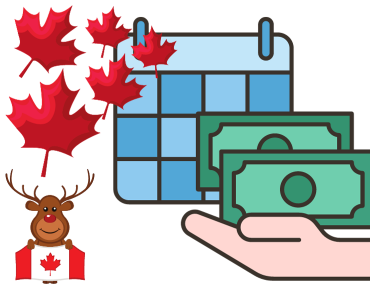As a journalist, it is my duty to inform and inspire curiosity in readers. Today, we will be delving into the topic of minimum wage in New Brunswick. With the cost of living constantly on the rise, it is important to understand the current state of minimum wage and what the future may hold for employees in this province. In this article, we will answer questions such as what the current minimum wage is, how it compares to other provinces, who is eligible for it, and how often it is reviewed and adjusted. We will also explore any exceptions to the minimum wage, how employees can report violations, and what changes we can expect in the future. So sit back, relax and let’s dive into this important topic.
What is the Current Minimum Wage in New Brunswick?
The current minimum wage in New Brunswick is $11.70 per hour, as of April 1, 2021. This is an increase from the previous rate of $11.50 per hour, which was in effect from April 1, 2020. The minimum wage applies to most employees who are paid by the hour, regardless of their industry or occupation. However, there are some exceptions, such as those who are self-employed or who work in certain industries like fishing and farming. Employers are required to pay their employees at least the minimum wage for every hour worked, and they cannot use tips or other gratuities to make up the difference. It is important to note that the minimum wage is a basic labour standard and employers can choose to pay their employees more than the minimum wage if they wish. The goal of the minimum wage is to provide workers with a fair and reasonable standard of living while also ensuring that businesses can afford to operate. The government of New Brunswick reviews and adjusts the minimum wage annually based on economic factors such as inflation and changes in the cost of living. Overall, the current minimum wage in New Brunswick reflects the province’s commitment to supporting workers and promoting economic growth.
How Does New Brunswick Minimum Wage Compare with Other Provinces?
When it comes to minimum wage, New Brunswick is currently in the middle of the pack among Canadian provinces. As of April 1st, 2021, the minimum wage in New Brunswick is $11.75 per hour, which is higher than Saskatchewan, Manitoba, and Quebec but lower than Ontario, British Columbia, and Alberta. In fact, the minimum wage in Alberta is currently the highest in Canada at $15 per hour. It’s important to note that some provinces have different minimum wage rates for different industries or age groups, so it can be difficult to make direct comparisons. However, overall, New Brunswick’s minimum wage is fairly average compared to other provinces. The government of New Brunswick reviews the minimum wage annually and makes adjustments as necessary based on factors such as inflation and economic growth. Some advocates for workers’ rights argue that the current minimum wage in New Brunswick is not enough to support a decent standard of living, particularly for those who are supporting families or living in areas with a high cost of living. They call for a higher minimum wage that takes into account the real cost of living in the province. On the other hand, some business owners argue that increasing the minimum wage too quickly could lead to job losses or cause businesses to move to other provinces with lower labour costs. Ultimately, the debate over minimum wage in New Brunswick is likely to continue as both workers and businesses try to find a balance that works for everyone.
Who is Eligible for the Minimum Wage in New Brunswick?
In New Brunswick, the minimum wage is applicable to most employees, regardless of their job title or type of work. This includes full-time, part-time, seasonal, and casual employees. However, there are a few exceptions to this rule. For instance, students who work part-time while attending school or training programs may be exempt from the minimum wage requirements if they are enrolled in a co-op program or work as part of a school curriculum. Additionally, certain professions such as commission salespeople, real estate agents, and insurance agents may also be exempt from the minimum wage requirements due to the nature of their work. It is important to note that exemptions to the minimum wage do not necessarily mean that these employees are not entitled to any compensation for their work. Instead, they may receive alternative forms of compensation such as commissions or bonuses. Employers are responsible for ensuring that their employees are receiving fair compensation for their work, whether it falls under the minimum wage requirements or not. Employees who are unsure about their eligibility for the minimum wage should speak with their employer or consult with the Employment Standards Branch of the Department of Post-Secondary Education, Training and Labour for clarification.
How Often is the Minimum Wage Reviewed and Adjusted in New Brunswick?
The minimum wage in New Brunswick is reviewed and adjusted annually by the province’s government. In 2021, the minimum wage was increased from $11.70 to $12.50 per hour, which was a 6.8% increase. The review and adjustment process is typically based on the consumer price index (CPI) for the previous year, which measures the average change in prices of goods and services consumed by households. If the CPI has increased, then the minimum wage will likely be adjusted accordingly to ensure that workers are keeping up with inflation and maintaining their purchasing power. However, if the CPI has remained stable or decreased, then there may not be an adjustment to the minimum wage. The annual review and adjustment process allows for transparency and predictability for both employees and employers, as they can anticipate changes in labour costs and plan accordingly. It also ensures that the minimum wage stays relevant and responsive to changes in the economy and cost of living. Overall, the annual review and adjustment process is an important aspect of ensuring that workers in New Brunswick are paid fairly and can support themselves and their families.
Are There Any Exceptions to the Minimum Wage in New Brunswick?
While the minimum wage in New Brunswick applies to most employees, there are some exceptions. For example, employees who work in the fishing industry are not entitled to the minimum wage. Instead, they are subject to a separate set of rules that govern their pay rates. Additionally, certain professions such as lawyers, doctors, and other regulated professionals are exempt from the minimum wage requirements. These professionals typically earn salaries or fees that are negotiated directly with their clients or employers. Another group that may be exempt from the minimum wage are individuals who are participating in a government-approved training program. These individuals may receive a lower rate of pay while they are learning new skills and gaining experience. However, it is important to note that even if an employee falls under one of these exceptions, they are still entitled to receive fair compensation for their work. Employers must ensure that their employees’ wages meet or exceed the minimum standards set out in New Brunswick’s employment laws. Failure to comply with these standards can result in penalties and fines for employers.
How Can Employees Report a Minimum Wage Violation in New Brunswick?
In New Brunswick, employees who suspect that their employer is violating the minimum wage law can report the violation to the Employment Standards Branch. The Branch is responsible for enforcing the Employment Standards Act, which sets out the rules for minimum wage, hours of work, vacation pay, and other workplace standards. To report a violation, employees can either file a complaint online or by mail. The complaint must include detailed information about the employer and the alleged violation. This may include the date and time of the incident, the amount of wages owed, and any evidence or witnesses to support the claim. Once the complaint is received, an officer from the Employment Standards Branch will investigate the matter and determine whether a violation has occurred. If a violation is found, the employer may be required to pay back wages owed to the employee, as well as any penalties or fines imposed by the Branch. It is important for employees to know that they are protected from retaliation for reporting a minimum wage violation. Employers are prohibited from firing, demoting or otherwise punishing an employee for making a complaint to the Employment Standards Branch. Overall, employees in New Brunswick have several options available to them if they believe that their employer is not complying with minimum wage laws.
The Future of Minimum Wage in New Brunswick: What Can We Expect?
The future of minimum wage in New Brunswick is uncertain. The current minimum wage of $11.70 per hour has not been adjusted since 2018, despite the rising cost of living. However, in November 2020, the provincial government announced that it would introduce legislation to tie the minimum wage to inflation. This means that the minimum wage will be adjusted annually based on the Consumer Price Index, which measures the average change in prices for goods and services over time. While this move has been welcomed by labour advocates, some argue that it does not go far enough to address the issue of low wages and poverty in the province. There are also concerns that tying the minimum wage to inflation may not keep up with the actual cost of living, as inflation does not always reflect the true cost of essential goods and services. In addition, there have been calls for a significant increase in the minimum wage to at least $15 per hour, which is considered a living wage in many parts of Canada. It remains to be seen whether the provincial government will consider such a proposal or continue with incremental adjustments tied to inflation. Overall, the future of minimum wage in New Brunswick is likely to involve ongoing debates and discussions about how best to address income inequality and support low-wage workers in the province.
As we wrap up our exploration of the current and future state of minimum wage in New Brunswick, it is clear that this is an issue that affects a significant portion of the province’s workforce. While there have been some recent positive developments, such as the increase to $11.70 per hour, there are still concerns around the eligibility requirements and potential exceptions to the minimum wage. It is also uncertain what changes may come in the future, as the province continues to navigate economic challenges and changing labour laws. As we move forward, it will be important for policymakers and employers to consider the impact of minimum wage on workers and their families, and to work towards creating fair and equitable working conditions for all. This issue is sure to remain a topic of debate and discussion in New Brunswick and beyond, and it will be interesting to see how it evolves in the coming years.
Minimum wage?
Alberta, British Columbia, Manitoba, New Brunswick, Newfoundland and Labrador, Nova Scotia, Ontario, Prince Edward Island, Quebec, Saskatchewan






Leave a Reply